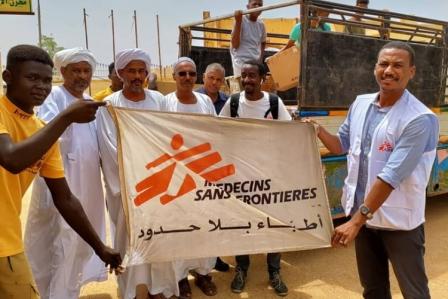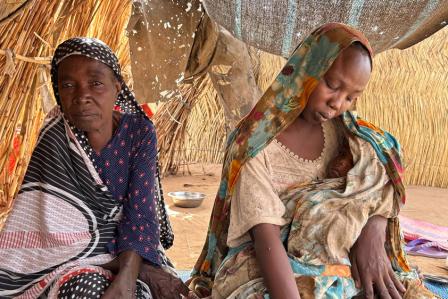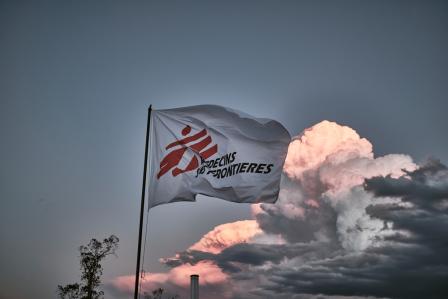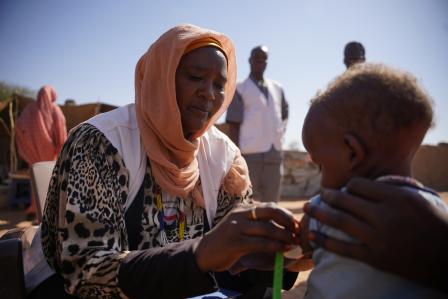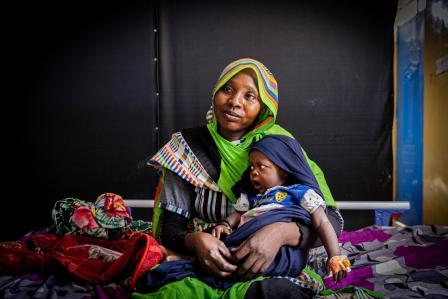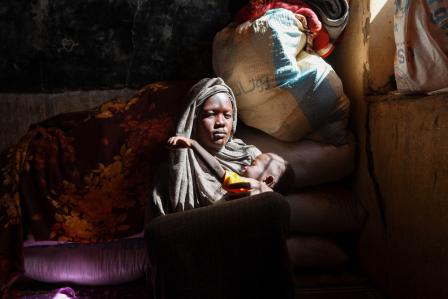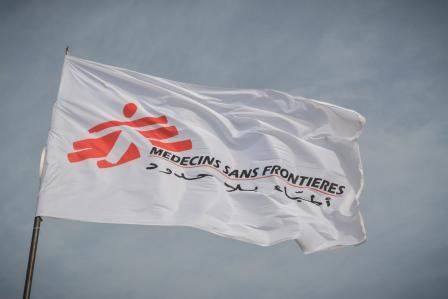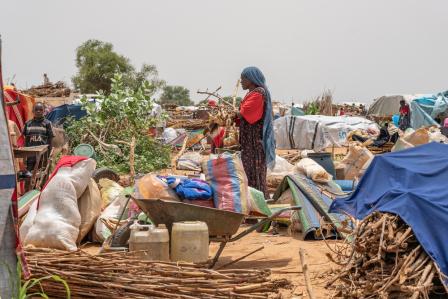Sudan: Doctors Without Borders forced to suspend support in Wad Madani due to obstructions and harassment

Patients wait outside the Doctors Without Borders clinic in Wad Madani. Sudan, June 2023.
- Doctors Without Borders has been forced to suspend work and withdraw staff from Madani Teaching Hospital, the only fully operational secondary health facility in the capital of Al Jazirah state.
- The needs in Wad Madani are critical and far from being met.
- Doctors Without Borders calls on warring parties to cease attacks on health facilities and ensure medical staff safety.
Port Sudan/Barcelona, 9 May 2024 - Doctors Without Borders / Médecins Sans Frontières (MSF) has been forced to suspend work and withdraw staff from Madani Teaching Hospital, the only functional hospital for the hundreds of thousands of people in dire need of medical assistance in the capital of Al Jazirah state, Sudan.
This extremely difficult decision comes after more than three months of relentless challenges trying to provide care at the hospital, including the growing insecurity; the inability to bring new staff and medical supplies into the area due to the denial of travel permits; and repeated security incidents, such as looting and harassment, affecting our ability to provide medical care.
Doctors Without Borders calls on the warring parties to stop violating health facilities and guarantee the safety of medical personnel and to grant the necessary travel permits for our staff and supplies.
The health system and basic services in Al Jazirah state have collapsed as a consequence of the fighting and the systematic blockade on supplies and personnel entering the area. Doctors Without Borders was the only international NGO providing some support in Wad Madani. Our departure leaves a deep void for people struggling to access healthcare and living in a very insecure environment without transportation to move around.Mari Carmen Viñoles, Operations Manager
In mid-December, fighting reached Wad Madani—the capital of Al Jazirah state located about 136 kilometers southeast of Khartoum—at least 630,000 people were forced to flee Al Jazirah towards other parts of Sudan according to the International Organization for Migration—many of whom had already been displaced. At the end of that month, Doctors Without Borders evacuated all staff from Wad Madani following the offensive from the paramilitary group Rapid Support Forces (RSF) in the city, which until then had been controlled by the Government led-Sudanese Armed Forces (SAF).
By January 13, Doctors Without Borders was able to send a team back to Wad Madani, where several hundred thousand people remained in which used to be one of the most populated cities of Sudan.
Since then, Doctors Without Borders has been supporting the emergency room, operation theatre, maternity, inpatient department—including pediatrics, the therapeutic feeding center, and adult and surgical wards—and pharmacy at Madani Teaching Hospital. We also provided mental health support and care for sexual violence. On top of this Doctors Without Borders also provided training, salary incentives to 240 Ministry of Health (MoH) staff, and food for patients.

A Doctors Without Borders staff member speaks with a patient in Fadasi Camp in Wad Madani. Sudan, December 2023. © Fais Abubakr
Between mid-January and the end of April, Doctors Without Borders provided nearly 10,000 outpatient consultations—malaria was the most common illness treated—2,142 antenatal consultations, and care to 16 survivors of sexual violence. During this period, there was a constant influx of patients into the emergency room, totaling 2,981 admissions. A significant number of these admissions involved physical injuries sustained in the ongoing violence.
Doctors Without Borders has now suspended all support to the facility, and we have relocated our staff to safer areas of Sudan. Over the last three months, our team and the supported MoH staff have faced repeated security incidents that have been either carried out or tolerated by the RSF, including looting of the hospital, stolen vehicles, and staff being retained, among multiple other incidents and pressures. Since January, Sudanese authorities have persistently denied travel permits to bring new staff and medical and logistic supplies into the city.
While the humanitarian and medical needs in Wad Madani and Al Jazirah are immense, we have no other option than to stop our work immediately and leave the area. The deliberate administrative blockages, the increasing insecurity, and the constant violations of the hospital as a neutral space made it impossible to continue providing services.Mari Carmen Viñoles, Operations Manager
Doctors Without Borders is willing to return to support the Madani Teaching Hospital to support people in Al Jazirah if the warring parties commit to respecting our medical work and ensure safe and uninterrupted access to the area. Doctors Without Borders calls on the RSF to stop violating medical facilities and guarantee the safety of MoH and Doctors Without Borders personnel. Doctors Without Borders also calls on the Government of Sudan-led military and civilian authorities to grant the necessary travel permits for our staff and supplies.
Doctors Without Borders currently works in and supports more than 30 health facilities in nine states in Sudan: Khartoum, White and Blue Nile, Al Gedaref, West Darfur, North, South and Central Darfur, and Red Sea. We run programs in both SAF- and RSF-controlled areas. Our teams provide trauma care, maternal and pediatric care, and treat malnutrition alongside other healthcare services. Doctors Without Borders teams are also supporting Sudanese refugees and returnees in South Sudan and eastern Chad.
